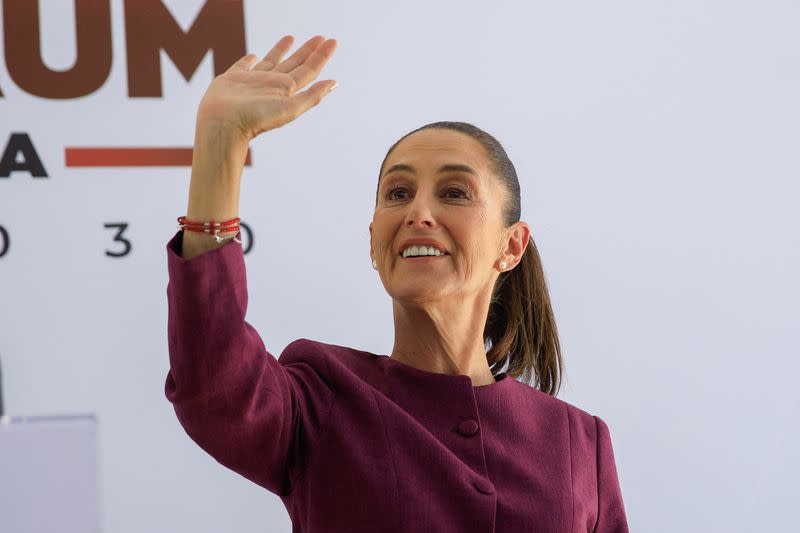Mexico's Sheinbaum seen tapping political heavyweights for state energy jobs

By Diego Oré
MEXICO CITY (Reuters) - Mexico's former foreign minister, the scion of a legendary political family, and a party boss are in contention for top energy-related jobs in President-elect Claudia Sheinbaum's government, sources said, suggesting political savvy will trump technical expertise in running state energy companies.
The cabinet of President-elect Claudia Sheinbaum will be a mix of old and new faces when it is announced next week, sources on her team said, as she looks to pursue her predecessor's main priorities while putting her own stamp on certain key areas.
State oil company Pemex and state power firm, the Federal Electricity Commission (CFE), are vital to President Andres Manuel Lopez Obrador's vision for Mexico's energy self-sufficiency.
Sheinbaum, a climate scientist, faces the tough balancing act of honoring her pledge to continue Lopez Obrador's policies, while also improving Mexico's environmental record and increasing renewable power generation.
One of the names doing the rounds to take the reins at Pemex, the heavily indebted oil producer which remains vital to government finances, is the ethnohistorian Lazaro Cardenas. Cardenas is a former advisor to Lopez Obrador, a former governor and son of the historical leader of the Mexican left, Cuauhtemoc Cardenas.
Two sources close to Sheinbaum said Cardenas was a frontrunner for the role though he could also be an option to head up the Energy Ministry.
Cardenas has no energy industry experience but has the great advantage of carrying the name of his grandfather, who as Mexican president in 1938 oversaw the nationalization of the country's oil industry, spawning Pemex.
That lineage suggests he is unlikely to drive dramatic reform at Pemex, a sentiment backed up by sources familiar with the ex-governor.
Naming political heavyweights with little industry experience to major state companies is common in Mexico although it has not universally been the case. For example, Ernesto Zedillo, president from 1994 to 2000, turned to energy expert Adrian Lajous to head Pemex.
Within the oil industry, the name of Deputy Finance Minister and Pemex board member Gabriel Yorio has been mentioned. Luz Elena Gonzalez, former finance secretary for Mexico City, is also in the running, according to industry sources.
Neither Cardenas, Yorio, Gonzalez immediately responded to requests for comment.
"Due to its evident market implications, the (Pemex pick) will showcase Sheinbaum's approach to a key entity for her priority of boosting Mexico's energy transition record," said Matias Gomez Leautaud, analyst at Eurasia.
At CFE, the largest electrical energy supplier in the country, former Foreign Minister Marcelo Ebrard and the president of Morena, Mario Delgado, are frontrunners to take charge, according to the two sources in Sheinbaum's team.
Neither have power experience but both wield significant influence, again suggesting the importance to Sheinbaum of having political savvy over technocratic expertise.
CFE has been at the center of Lopez Obrador's moves to increase the state's stake in power generation. But both CFE and Pemex have been criticized for their poor environmental records and investors will be watching whether Sheinbaum can wring changes at the state companies.
Critics have also slammed CFE for failing to boost production capacity, with Mexico being hit with power blackouts amid scorching temperatures and widespread drought.
Delgado and Ebrard's communications team declined to comment.
"We've always expected a high degree of continuity given Sheinbaum's alignment with President Andres Manuel Lopez Obrador's priorities," Gomez Leautaud said. "In some areas, such as the finance ministry, continuity is a good signal for markets (...) In others, such as Pemex's management, it would raise further concerns given the lack of results from the current administration in this front".
(Reporting by Diego Ore; Additional reporting by Ana Isabel Martinez and Adriana Barrera; Editing by Stephen Eisenhammer and Alistair Bell)


